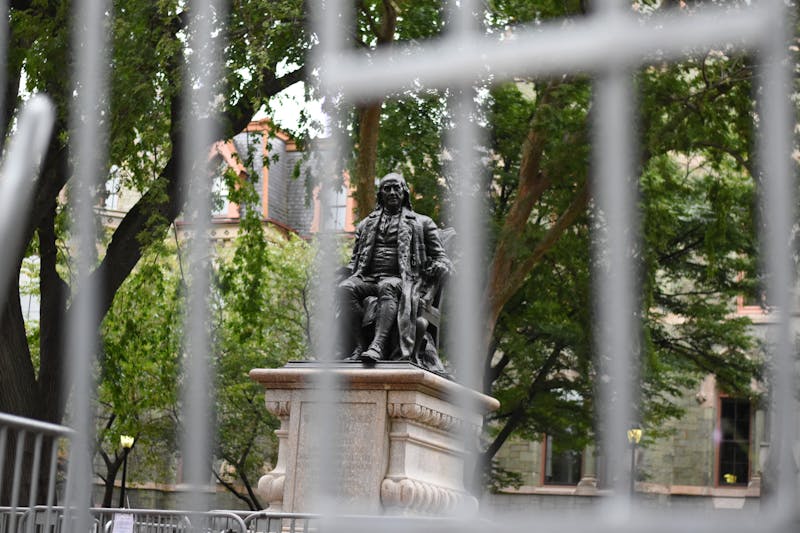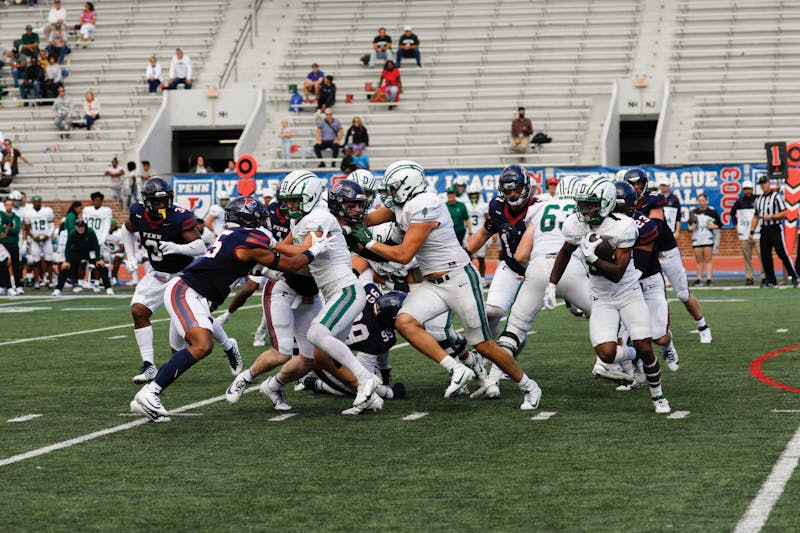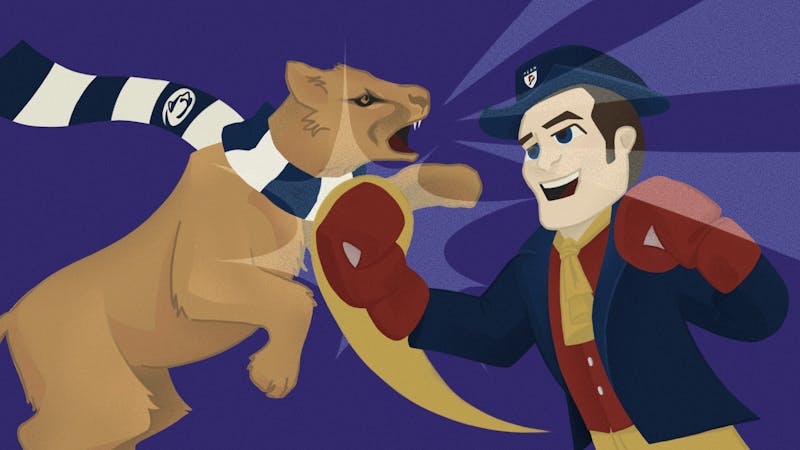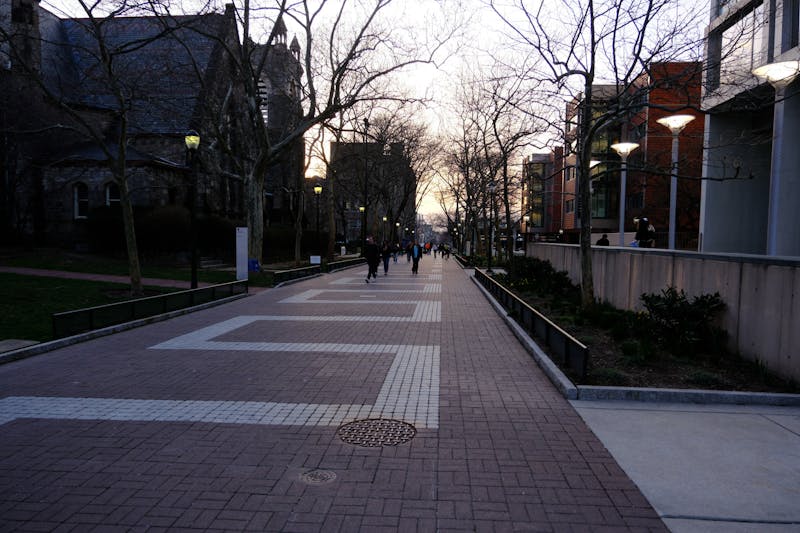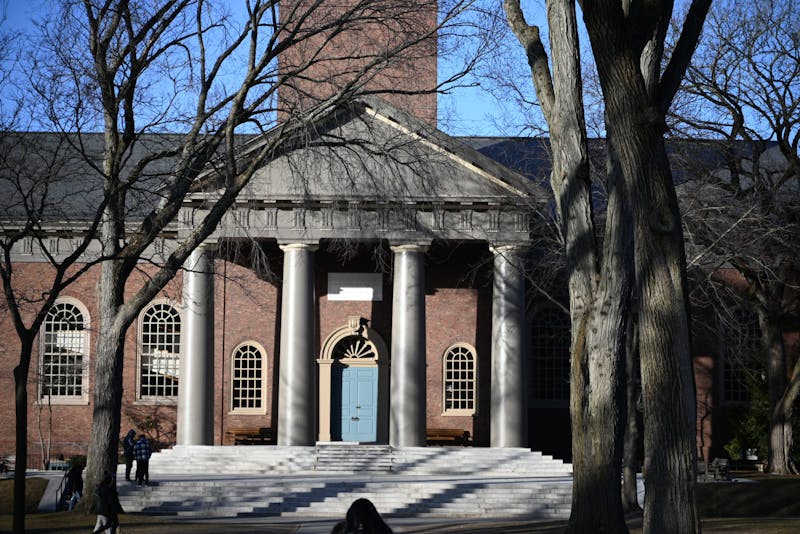
A Penn football fan throws toast at a football game against Princeton on Nov. 18, 2023.
Credit: Weining DingEarlier this week, The Daily Pennsylvanian reported on Penn’s ban on daytime parties during Homecoming, a decision which was met with significant pushback from leaders of the University’s Greek organizations.
Instead, students are encouraged to attend a University-sponsored tailgate taking place in tandem with Penn football’s game against Harvard; it is part of the official Homecoming programming which registered events, such as parties, are not permitted to conflict with. While the University cited limited support staff as the reason for its decision, the secondary motivation is clear: get students in the stands.
As attendance at Penn sporting events has declined in recent years, the cancellation of the Quakers’ primary Homecoming competition is the latest in a string of University efforts to rejuvenate student support. But in making this decision, Penn fails to acknowledge the key ingredient that makes sports so popular at other campuses across the country: connection.
While fans at Penn State and Texas flood the stands on home game days because their social culture revolves around them, Penn is attempting to manufacture that widespread support by axing the student body’s preferred alternative. While the move may bring a slight uptick in student attendance, it will do little to quell the school’s issue in the long term, marking another misstep in the University’s efforts to revive the student section.
During my time at Penn, I have attended countless Quaker sporting events from season-openers to Ivy League championships. As such, I’ll be the first to tell you that the school’s sports spirit is distinctly lacking — the average student probably couldn’t tell you who Aidan Sayin is, and opposing fans routinely outnumber the Red and Blue faithful at home football games. It’s easy to see the rabid sports culture at other schools across the nation with a shade of jealousy, particularly if you work for the governing body that has a stake in the game.
For its part, Penn Athletics has not taken the issue lying down. The school routinely organizes promotions and giveaways designed to draw students to the stadium, offering rewards from video game consoles to Nike apparel. Most events offer free admission to Penn Card holders. These efforts are comprehensive, but remain incapable of breaking down the foremost barrier to student enthusiasm: interest.
On the whole, Penn students are apathetic toward athletics. Though it has not always been this way, modern campus culture has decidedly shifted away from bleachers and buzzers, and toward student-central events like parties. Homecoming remains a day of tremendous student gathering, but the stage for that camaraderie is fraternity backyards rather than Franklin Field.
This makes the cancellation of daytime parties not only an overstep by the University, but a misguided attempt to solve its present problem. Penn students’ indifference toward Quaker sports is an enduring sentiment, one that will not be overturned by direct intervention by an authoritative body. The term “University-sponsored” at the front of the Homecoming tailgate has an instant dampening effect, particularly when the event costs up to $20 per ticket for those with an alcohol wristband, and takes place in the backdrop of the parties’ cancellation.
There are several more likely outcomes following the University’s decision. The first is that parties will flock off campus — many Greek organizations have satellite houses that are not held to the same restrictions as on-campus venues. These events offer the types of gatherings students prefer, but also pose additional burdens on campus support staff due to their lack of official registration.
The second, and perhaps more costly, is the elimination of the campus’s ability to coalesce. At a university with minimal school spirit, Homecoming represents a rare opportunity for the student body to unite under the Red and Blue — an opportunity that may be in jeopardy as its most popular tradition faces University opposition.
I hope that over time, Penn regains its sense of sports enthusiasm. But if it does, it will be because students view the stands as a place for campus connection, not because the University has blocked off every other avenue. The Red and Blue deserve more support, but attempting to force the student body’s hand is the wrong way to get it.
WALKER CARNATHAN is a junior and current DP Sports Editor studying English and Cinema and Media Studies from Harrisburg, Pa. All comments should be directed to dpsports@thedp.com.
The Daily Pennsylvanian is an independent, student-run newspaper. Please consider making a donation to support the coverage that shapes the University. Your generosity ensures a future of strong journalism at Penn.
Donate







